Press Release July 7, 2007
Women at US Social Forum Name
Feminism as Key to
Making Connections and Building Alliances
By Margaret Thompson
The “F” word made it to
the US Social Forum by way of the Latina, African American, Native
American, and lesbian women, and women with disabilities who
recognize the urgency of connecting all issues and forms of
discrimination and naming feminism as a critical approach to making
these connections.
|
“Feminism is about power and it is about the power to
control your own life, your own body and resist what [has
been called] hetero-patriarchy,” declared Loretta Ross, of
longtime feminist and human rights activist and scholar of
SisterSong Women of Color Reproductive Health Collective.
“If you agree with that, then you’re a feminist. Feminism
is about the power to question what gender, race and class
means to you, and to decide when and if you want to fit into
the boxes others have prepared for you.” |
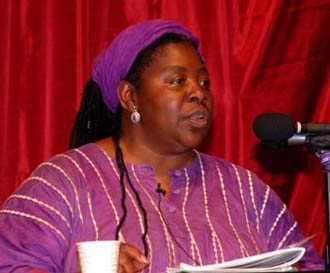
Loretta Ross talks about
feminism as
power to control one's own life |
Ruby Beth Buitekant, a
young African American university student from Atlanta, echoed Ross’
perspective, noting that “feminism is changing by becoming more
inclusive and real for all different kinds of women who are affected
and identify in different ways. That is why I use that identity
(feminism) to talk about racism, about classism and all kinds of
issues that are so interconnected. What empowers me to speak about
all these issues is being a woman. Feminism is hopefully taking a
new turn by becoming more transnational also... “
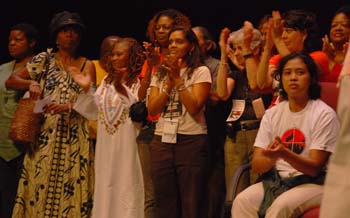 |
Throughout the USSF, women were a strong presence in most of
the 960+ workshops and plenaries, which were organized
around six main themes, including war and militarism,
immigrants’ rights, Gulf Coast reconstruction, energy
exploitation, women’s and GLBT (gay/lesbian/bisexual/transgendered)
rights, indigenous sovereignty, and workers’ rights.
|
Other issues
addressed by the 9,000 participants at the USSF included free trade
and globalization, the criminal “injustice” system, and poverty
including the human right to housing and food. The event took place
June 27-July 1, 2007 in Atlanta, Georgia.
“For me it’s been
interesting to be here to see so many women put themselves out there
in workshops and conversations…on a broad array of issues including
many that don’t get a lot of attention,” said Cindy Clark of Just
Associates (JASS) of the Women’s Transformation Watch (Observatorio
de la Transgresion Feminista).
The Watch, organized by
Just Associates (JASS) and FIRE (Feminist International Radio
Endeavour) at the Forum, is an initiative created in 2006 by Meso-American
feminists and US human rights activists, and was designed in this
event to observe women’s participation and influence at the USSF, as
it has in other events in Central America during the past year.
Based on a popular education approach, the Watch organizers hope to
contribute to building and strengthening of feminist and women’s
social and political movements in the Americas and around the world.
As part of the Women’s
Transformative Watch, Clark reflected about the strong presence of
young women at the Social Forum. “I have attended lots of sessions
organized by young women, young people, and to me it’s more than
saying ‘aren’t these young women so capable to organize these
sessions’, but the fact that they are where they should be by coming
and participating actively at this event.”
FIRE – Feminist
International Radio Endeavour – worked with the Watch to look at how
women are “crossing the line” and what it means to them. Buitekant
told FIRE, “To me, crossing the line as feminists means playing the
specific roles that women have in society but then using this
politically to [achieve] positions of power. I learned feminism
from my mother and in school, but also building community with women
in college.”
María Suárez of FIRE
recalled, “One woman I interviewed said crossing the line in this
moment for women and feminists is about looking for ways to
integrate agendas and stop this dichotomous fragmentation of women’s
rights on one side, and “stop the war” and so on with the other. So
that means making connections among different constituencies or
groups to build social movements. A migrant woman said that
crossing the line for her was about crossing the borders, linking
the borders, so she had a very concrete interpretation,” noted
Suárez.
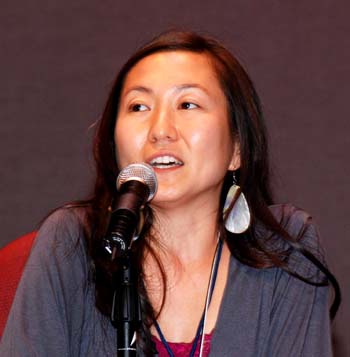 |
Mia
Mingus, a disabled lesbian woman of color and longtime
activist of Georgians for Choice spoke at the Gender &
Sexuality Plenary about the importance of making connections
and alliances: “We cannot allow ourselves to be divided and
conquered, we know that our liberation is tied up with other
women including women of color, disabled women, [GLBT]
families…and the social justice movement.” |
Andrea Smith of
INCITE! Women of Color
Against Violence
spoke of these connections when she described
how “hetereo [sexual] patriarchy is fundamental to empire because
patriarchy is what naturalizes social hierarchy, the idea that men
naturally rule over women, that elites naturally rule over everyone
else. In the history of Indian genocide, the first task that
colonists took on was to integrate patriarchy into native
communities who wouldn’t accept colonial domination until native men
started treating native women the way that white men treat women.”
Smith noted that sexual violence against native women served as a
“primary tool” for colonialism and white supremacy “by rendering
women inherently rapable, our land inherently invadable and our
resources inherently extractable.”
|
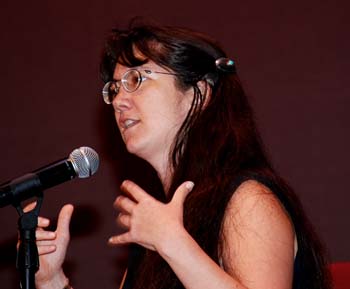
Andrea Smith of
INCITE!
Women of Color Against Violence
|
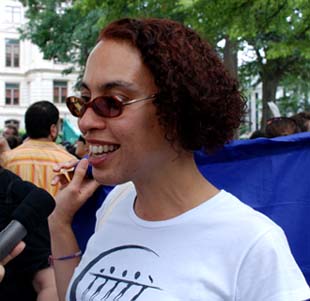
Miriam Nobre of Brazil &,
Sec-General
of the World March of Women |
In an interview with
FIRE, Miriam Nobre, an Afro-Brazilian feminist and Secretary-General
of the World March of Women said she believes that “crossing the
line in communications is everything that is outside the control and
agenda of corporate power in media because they control most media
to impose an agenda that is corporate. That is why I like to see
expression through art, alternative media and exchange.”
Cindy Domingo, a US
immigrant, told FIRE that “crossing the line by women here means
learning from women in other parts of the world.” Nobre said that
“in order to confront the power of the transnational corporations
that use women’s bodies as terrain for experimentation, and also do
the same with land and seeds, we need to develop further the
relationship among us in Latin America and feminists in the USA that
do not necessarily come from [middle class] liberal agendas, but are
part of immigrant movements, indigenous, farmers, and workers,
[among others]...”
Valerie Miller, also of
JASS noted, “To me what is important in these observations of the
WATCH are the processes and experiences that women are talking about
that help build strong connections.”
Suárez noted that she had
heard women comment about the theme of the USSF “One world is
possible,” which is based on the World Social Forum theme of 2004.
“To say that one world is possible, we have to make sure that
doesn’t mean substituting one world with one other single
perspective, but a world where many perspectives can have a place.”